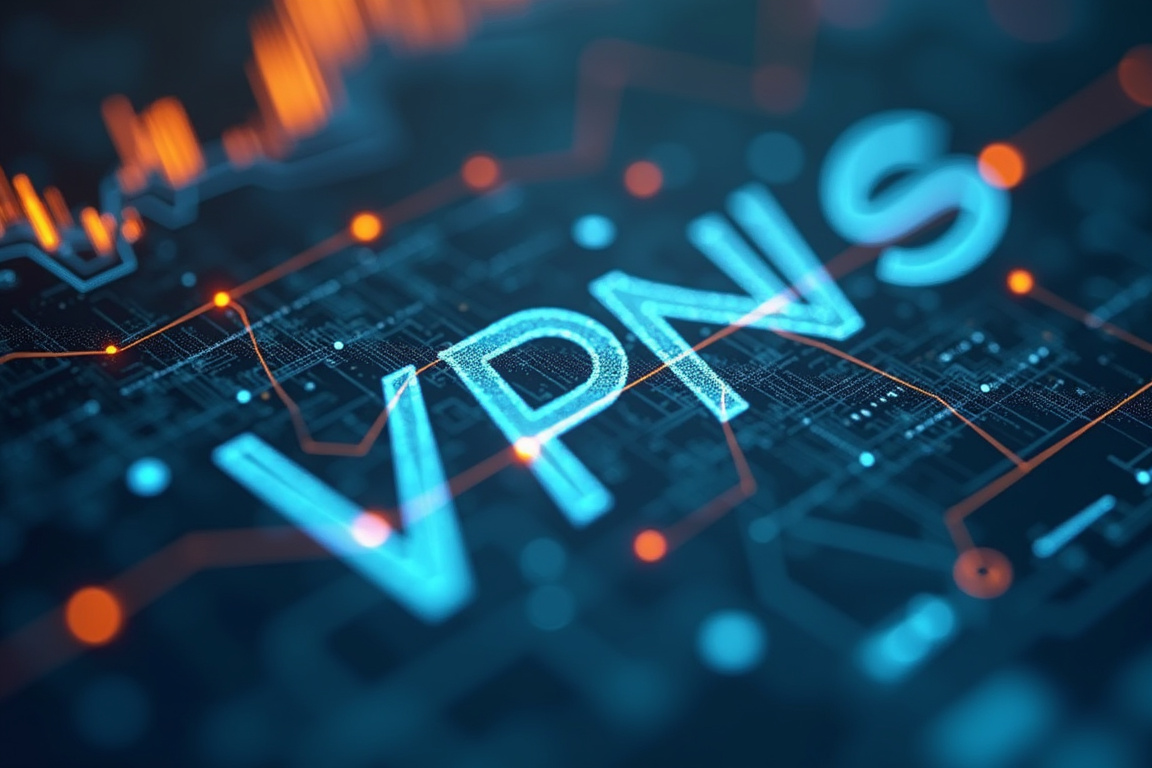VPNs for Independent Publishers: Protecting Author Contracts

Table of Contents
Navigating Digital Rights: VPNs as Essential Tools
The independent publishing landscape, once a niche corner of the literary world, has exploded in recent years, empowered by digital platforms and a growing demand for diverse voices. This surge in independence, however, presents unique challenges, particularly in safeguarding sensitive information. Author contracts, unpublished manuscripts, financial data, and strategic marketing plans, all vital assets of any publishing house, become particularly vulnerable when handled by smaller operations often lacking the robust security infrastructure of larger corporations.
This article delves into the imperative of Virtual Private Networks (VPNs) for independent publishers, focusing on their role in protecting author contracts and other critical data. We'll explore the specific threats faced by these publishers, dissect the benefits a well-implemented VPN offers, and lay out best practices for integrating VPNs into a comprehensive security strategy. It's not merely about technical solutions; it's about fostering trust with authors, ensuring business continuity, and upholding the ethical standards expected of stewards of intellectual property.
The heart of any publishing house lies in its relationships with authors and the binding agreements that define those partnerships. Author contracts, detailing royalty percentages, territorial rights, publication timelines, and other key terms, are fundamentally confidential documents. A breach of this confidentiality can have devastating consequences.
Leaked financial terms can breed discontent among authors and erode trust. Premature disclosure of publication dates can disrupt marketing strategies and allow competitors to gain an unfair advantage. Furthermore, the very act of losing control over these agreements can expose the publisher to legal challenges and reputational damage.
A VPN serves as a crucial shield against such breaches. It encrypts all data transmitted between the publisher's devices and the internet, creating a secure tunnel that prevents eavesdropping by hackers or malicious actors. This protection extends to all aspects of contract management, from drafting and negotiation to signing and storage.
When contracts are shared via email, uploaded to cloud storage, or accessed remotely by editors or agents, the VPN ensures that the data remains protected from interception. Beyond external threats, VPNs also address internal risks. Independent publishers often collaborate with freelancers, editors, and designers working remotely, potentially using unsecured public Wi-Fi networks.
A publisher VPN can provide these external collaborators with secure access to the publishing network, preventing data breaches that could originate from these vulnerable connections. Moreover, a VPN enables the implementation of access controls, restricting individual users to only the data they need, thereby limiting the potential damage from compromised accounts or insider threats. By enforcing secure connections and managing access privileges, a VPN significantly enhances author contract security and protects against both intentional and unintentional data leaks.
Considering the reputational damage a leak can inflict for a smaller firm, this degree of protection is essential.
Understanding the VPN Advantage: Shielding Sensitive Data Transfers
Beyond the sanctity of author contracts, the broader spectrum of “publishing data” demands equally rigorous protection. This encompassing term includes a wealth of sensitive material that is vital to the success and stability of an independent publishing house. Consider the unpublished manuscripts themselves, often representing years of an author's creative labor.
Premature leaks of these works can devastate potential sales, invite plagiarism, and significantly damage the author's trust in the publisher. Then there are the marketing plans, brimming with confidential insights into target audiences, pricing strategies, and promotional campaigns. Such information in the hands of competitors represents a serious loss of competitive advantage, potentially leading to a decline in market share and revenue.
Financial records, encompassing royalty payments, operating expenses, and financial projections, are also highly sensitive and require robust protection against fraud, embezzlement, and identity theft. Finally, author correspondence, containing personal details, creative insights, and business negotiations, should be treated with the utmost confidentiality to maintain strong relationships and avoid potential legal liabilities. A VPN provides a comprehensive solution for securing all these diverse data streams.
By encrypting all internet traffic, it creates a safe and private channel for communication and data transfer. When editors collaborate on a manuscript, their edits, comments, and suggestions are protected from interception, ensuring the integrity and confidentiality of the work in progress. Marketing plans shared internally or with external consultants are shielded from prying eyes, safeguarding the publisher's competitive edge.
Financial transactions, such as online banking, royalty payments, and invoice processing, are secured through the VPN's encryption, minimizing the risk of fraudulent activity and protecting sensitive financial information. Moreover, a VPN facilitates secure access to cloud-based storage and management solutions, increasingly relied upon by independent publishers. By encrypting the connection to these cloud services, a VPN prevents unauthorized access to stored data and ensures that the publisher retains control over their information, even when it is stored on third-party servers.
This is particularly crucial for publishers who work with sensitive author data and need to comply with data privacy regulations. The implementation of a VPN also supports compliance with industry best practices and legal requirements for data protection. Many countries have laws and regulations that require businesses to protect the personal data of their customers and employees.
A VPN can help independent publishers meet these obligations by providing a secure and encrypted environment for handling sensitive information. Furthermore, a VPN demonstrates a commitment to data security, which can enhance the publisher's reputation and build trust with authors, partners, and customers. In conclusion, the concept of "publishing data" encapsulates a vast range of sensitive information that is crucial to the success of an independent publishing house.
A VPN provides a versatile and effective solution for protecting this data by encrypting traffic, securing cloud access, and supporting compliance with data protection regulations. These VPN implementations collectively reinforce confidentiality protocols across and all publishing operations.
Mitigating Cyber Threats: Securing Author Communications and Contract Negotiations
Selecting the right VPN for an independent publisher is not a one-size-fits-all endeavor. The market is saturated with options, each promising varying degrees of security, speed, and functionality. A hasty decision can result in inadequate protection or unnecessary expenses.
Therefore, a careful assessment of the publisher's specific needs and priorities is paramount. Several key criteria should guide the selection process. First and foremost is the strength of the encryption protocols employed.
Look for VPNs that utilize robust and widely vetted protocols like OpenVPN or WireGuard. These protocols offer state-of-the-art encryption, ensuring that data remains unreadable even if intercepted. Avoid providers that rely on outdated or proprietary protocols, as these may be vulnerable to exploits.
Closely related to encryption is the provider's logging policy. A strict "no-logs" policy is essential for protecting the privacy of both the publisher and their authors. This means that the VPN provider does not track or store any user activity, including browsing history, IP addresses, or connection timestamps.
Scrutinize the provider's privacy policy carefully to ensure that it is clear, transparent, and enforceable. Be wary of providers that claim to have a no-logs policy but collect metadata or usage statistics that could potentially be used to identify users. The location of the VPN server network is another crucial factor.
Choose servers located in countries with strong data protection laws and minimal government surveillance. This can help to ensure that your data is protected from unauthorized access by law enforcement or intelligence agencies. Avoid servers located in countries with a history of censorship or data sharing agreements with authoritarian regimes.
The speed and reliability of the VPN connection are also critical considerations, particularly for publishers who rely on remote collaboration and frequent data transfers. A slow or unreliable VPN can disrupt workflows and frustrate users. Look for providers with a large network of servers and a reputation for providing fast and stable connections.
Run speed tests to evaluate the performance of different servers in different locations. The user interface and ease of use of the VPN client are also important, especially for users who are not technically savvy. Choose a provider with a well-designed and intuitive client that is easy to install, configure, and use.
The client should also offer a range of features, such as a kill switch (which automatically disconnects the internet connection if the VPN connection drops), DNS leak protection (which prevents DNS requests from being sent to the ISP's servers), and automatic server selection (which chooses the fastest server based on the user's location). Finally, consider the provider's customer support. A reliable and responsive customer support team can be invaluable in resolving technical issues and providing assistance with VPN configuration.
Look for providers that offer multiple channels of support, such as email, chat, and phone. Test the responsiveness of the customer support team before committing to a subscription. In summary, the selection of a VPN should be based on a careful evaluation of encryption strength, logging policy, server location, speed, ease of use, and customer support.
By prioritizing these factors, independent publishers can choose a VPN that effectively protects their sensitive data and supports their business operations. This careful selection empowers publishers to further reinforce publishing data defenses.
Enforcing Geographic Restrictions: Maintaining Control Over Content Distribution
The implementation of a VPN is not a silver bullet for data security; it's a crucial component of a broader, more comprehensive security strategy. A VPN provides a secure tunnel for data transmission, but it doesn't address other potential vulnerabilities within the publishing house's IT infrastructure or employee practices. Therefore, integrating a VPN effectively requires a multi-faceted approach that encompasses technical safeguards, policy development, employee training, and ongoing monitoring.
One of the first steps is to conduct a thorough risk assessment to identify potential vulnerabilities and prioritize security measures. This assessment should consider all aspects of the publishing business, from author contract management to financial transactions to marketing operations. Identify the most sensitive data assets, the potential threats they face, and the impact of a data breach on the business.
Based on the risk assessment, develop comprehensive security policies and procedures that address all aspects of data protection. These policies should cover topics such as password management, data storage and backup, acceptable use of technology, incident response, and data breach notification. Ensure that all employees are aware of these policies and are trained on their responsibilities for protecting sensitive information.
Employee training is a critical component of any security strategy. Employees are often the weakest link in the security chain, as they can be susceptible to phishing attacks, social engineering scams, and other forms of cybercrime. Provide regular security awareness training to employees, covering topics such as how to identify phishing emails, how to protect passwords, how to avoid downloading malware, and how to report security incidents.
Emphasize the importance of data security and the potential consequences of a data breach. In addition to employee training, implement technical safeguards to protect against cyber threats. This includes installing firewalls, antivirus software, and intrusion detection systems.
Keep all software up to date with the latest security patches. Implement strong access controls to restrict access to sensitive data to only those employees who need it. Use multi-factor authentication to add an extra layer of security to user accounts.
Regularly monitor the network for suspicious activity and investigate any potential security incidents promptly. Develop an incident response plan that outlines the steps to be taken in the event of a data breach. This plan should include procedures for containing the breach, notifying affected parties, and recovering from the incident.
Test the incident response plan regularly to ensure that it is effective. In addition to technical and policy measures, consider obtaining cyber insurance to protect against the financial consequences of a data breach. Cyber insurance can help to cover the costs of data recovery, legal fees, notification costs, and other expenses associated with a data breach.
Finally, regularly review and update the security strategy to adapt to evolving threats and technologies. The threat landscape is constantly changing, so it is important to stay informed about the latest security risks and implement proactive measures to mitigate those risks. This proactive monitoring ensures ongoing author contract security.
By integrating a VPN with these other security measures, independent publishers can create a robust and comprehensive security framework that protects their sensitive data, safeguards their reputation, and ensures business continuity.
In conclusion, the independent publishing world, while brimming with opportunity and creative freedom, faces significant cybersecurity challenges, demanding a proactive and layered approach to data protection. The vulnerability of author contracts and the broader category of publishing data necessitates a robust security infrastructure, with a VPN acting as a cornerstone in safeguarding digital assets. From encrypting sensitive communications to securing remote access for collaborators, VPNs offer a vital layer of protection against both external threats and internal vulnerabilities.
However, it's crucial to remember that a VPN is not a panacea. Its effectiveness hinges on careful selection, proper implementation, and integration within a comprehensive security strategy. Choosing the right VPN provider requires diligent research, considering factors such as encryption protocols, logging policies, server locations, speed, ease of use, and customer support.
A rushed decision can lead to inadequate protection and a false sense of security. Furthermore, implementing a VPN effectively demands more than just installing the software. It requires developing clear security policies, providing regular employee training, and implementing technical safeguards to protect against a range of cyber threats.
This includes firewalls, antivirus software, intrusion detection systems, strong access controls, and multi-factor authentication. Regular monitoring, coupled with a well-defined incident response plan, are crucial for detecting and mitigating potential security breaches. The commitment to securing publishing data goes beyond mere technical implementation; it's a reflection of the publisher's values and their dedication to building trust with authors.
A proactive approach to security demonstrates a commitment to protecting their intellectual property, safeguarding their confidential information, and fostering a long-term partnership built on mutual respect and trust. By prioritizing data security, independent publishers can not only protect their business from financial losses and reputational damage, but also create a competitive advantage in a rapidly evolving digital landscape. In an era where data breaches are becoming increasingly common, a robust and well-implemented security strategy can be a key differentiator, attracting authors and partners who value confidentiality and trust.
Ultimately, the success of an independent publishing house depends on its ability to protect its core assets: its authors, its content, and its reputation. Investing in a VPN and integrating it within a comprehensive security strategy is an investment in the future of the business, ensuring its long-term viability and success in a competitive and ever-changing market. Embracing a culture of security, where every employee is aware of the risks and committed to protecting sensitive data, is paramount.
By fostering this culture and implementing the right tools and strategies, independent publishers can navigate the digital landscape with confidence, securing their data, protecting their authors, and building a thriving and sustainable business. The effective use of a VPN for media and publishing ensures long-term viability.
Stay Updated
Get the latest VPN news, tips, and exclusive deals to your inbox.




